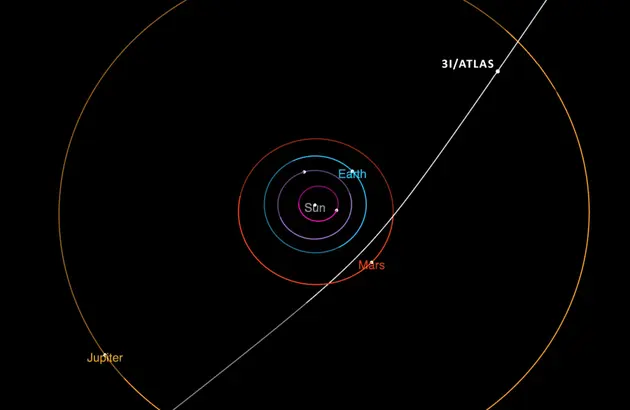T4K3.news
Six word message proposed for 3i atlas
A Harvard scientist urges sending a six word beacon to the interstellar object 3i atlas before it possibly reaches Earth.

NASA classifies 3I/ATLAS as a comet, but Avi Loeb argues for outreach while there is still a chance.
Scientist proposes six words be sent to space object he says is not natural
Harvard astronomer Avi Loeb has urged researchers to send a six word message to the interstellar object 3I/ATLAS, arguing outreach should occur before it passes through the inner solar system. NASA classifies 3I/ATLAS as a comet based on current data, yet Loeb notes features such as a glow ahead of the object and the absence of a prominent tail, which he says could suggest a non natural origin. He says the only practical way to reach the object is with a beam of light.
Loeb promoted the idea in a Medium post and in an interview with MailOnline. He suggests the message Hello, welcome to our neighborhood. Peace! could be sent as a clear invitation. He believes that if signals reach Earth, artificial intelligence could help decode any possible messages, and that a simple, shared language might open a long-term exchange if the object contains advanced technology. 3I/ATLAS is expected to approach its closest point to the Sun on October 29, 2025, and Loeb has warned it could reach Earth by Christmas.
Key Takeaways
"The only way to reach it now is with a beam of light."
Loeb on contact method
"A visitor to our backyard, like 3I/ATLAS, can easily enter our home planet."
Travel time and proximity claim
"Having no communication at all with a stranger would trigger a transactional response."
Loeb on the importance of dialogue
This proposal tests a core tension in science: the lure to reach beyond known boundaries versus the caution needed when signals from unknown sources appear. A six-word beacon is more a symbol than a plan, signaling curiosity to the public and policymakers alike. If funded, it could influence how agencies weigh bold ideas against risk and public scrutiny.
The plan relies on AI to translate any messages, which raises questions about accuracy and accountability. It also reframes contact as a public-facing project that could reshape expectations about space diplomacy. Whether the world should reach out or wait for clearer evidence remains a live debate, and the discussion around 3I/ATLAS exposes how science, policy, and imagination collide in the era of rapid information exchange.
Highlights
- A light beam could become our first handshake
- We may need a shared language to speak across space
- Curiosity needs caution when facing the cosmos
- Bold questions require careful steps in the next phase
Public reaction and funding risk to alien contact idea
Proposing direct contact with a mysterious interstellar object could spark public debate, political sensitivities, and shifts in research funding. The plan risks sensationalism and misinterpretation.
The debate tests how boldly science should act when the unknown calls for a response.
Enjoyed this? Let your friends know!
Related News

Interstellar Object 3I/ATLAS Captures Scientific Attention

NASA plans to study interstellar object with Juno spacecraft

Health guidance collisions with eating disorder recovery

ASU's Kenneth Carrell comments on interstellar comet 3I/ATLAS

Interstellar object 3I/ATLAS may emit its own light

Flight attendants share love story after brief encounter
Documentary Investigates Iconic Vietnam Photo Controversy

Electricity prices rise faster than inflation
